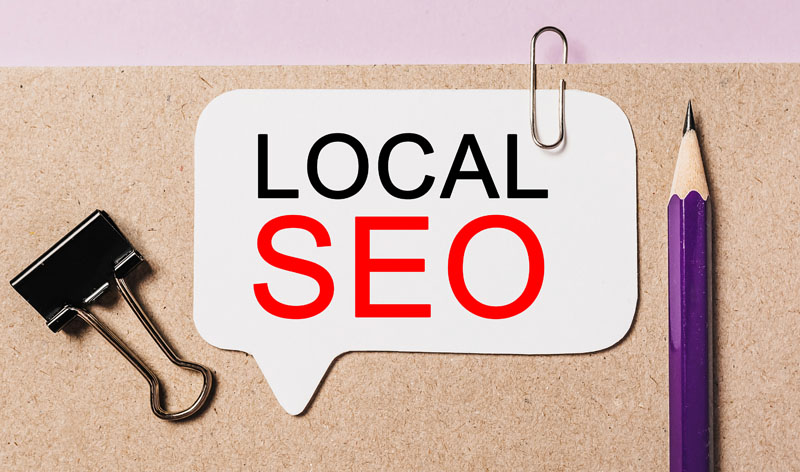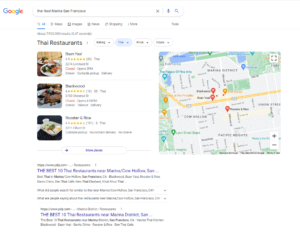By Reinaldo R Reyes on Jun 13, 2022

At one time or another, pretty much everyone, 97% of us, searches the Internet to find local businesses. That makes local SEO critically important.
We look for restaurants for a Saturday night outing, bakeries to have a cake made for special occasion, shops that carry pet paraphernalia, tailors, lawyers and a million other products and services.
Every business wants to be discovered online, but if you want to get your business discovered by your nearby local audience, you need to optimize your local SEO. Sure, there are other search engines, but let’s face it, you need to focus on Google. No other search engine comes even close to the number of searches done on Google.
There are 3.8 million Google searches per minute on average across the globe. That’s 92.49% of all searches.
And of all the searches done on Google, 46% are aimed at finding local information.
But where do all these local searches lead? They lead directly to sales, that’s there. When people search for a local business on a mobile device, 88% call or visit the business within 24 hours.
Focusing on local search makes it that much easier to rank on the first page of Google. And if you aren’t on the first page, you may as well not even bother. 75% of people never get past the first page of Google search results.
In case you missed it, Google My Business is now known as Google Business Profiles. When you do a local business search, Google will show some top Google Business Profiles at the top of the first page along with maps that pinpoint the locations of those businesses.
For example, if someone wants to visit a Thai restaurant in the Marina neighborhood of San Francisco, they might search for Thai food Marina San Francisco and get the below result. Notice that Google Business Profiles and a map appear at the top before articles that discuss Thai restaurants in the Marina district.

According to Google, local search engine results page (SERP) rankings for Google Business Profile are primarily based on three factors: relevance, distance and prominence. So, location isn’t everything. If Google’s algorithms determine that a business a bit farther away from you (but still close enough to visit) is more likely to have what you want, it’s going to rank higher in local search results. One thing is certain: you have to earn a high Google Business Profile ranking. You can’t buy it.
Relevance is how well a Google Business Profile matches your search. It’s important that you add enough detail to the information you provide for your Google Business Profile for Google to get a good handle on what your business does so the algorithms point relevant searches to your business.
This one is pretty obvious. If someone searches for “Thai restaurants in San Francisco” they probably are seeking a nearby place for dinner. They don’t have much interest in a Thai restaurant in LA or even elsewhere in the Bay Area such as Berkeley.
If someone is searching for Thai restaurants in the Marina in San Francisco, or if the search is originating from the Marina neighborhood (without any location information other than San Francisco) and Google can tell the search comes from the Marina district, then the Google algorithm will favor restaurants in the Marina district not just anywhere in San Francisco.
Prominence refers to how well known a business is. If a place is well known to people offline, it is more likely to rank higher than a business that few know about. Google will also factor in information across the Internet such as links, directories, articles, reviews, etc. to help determine prominence. Increasing your number of online reviews and positing ratings can help your business in this area, as can good SEO.
Your listings just begin on Google Business Profile. To further improve local SEO, list your business on additional directories where your customers can find your business. These could be directories of local businesses in your area or industry/profession specific directories such as those for attorneys.
Check anywhere your business is listed or mentioned online and make sure the information about the name of your business, website link, address, phone number, hours of operation and what your business does is correct and consistent. You may think we don’t need to mention this one, but you would be surprised.
Some places to check are your own website, your Google Business Profile, directories such as Yellow Pages, Facebook and other social media accounts, search engines such as Yahoo and Bing, Apple Maps and review sites relevant to your business such as TripAdvisor and Yelp.
There are tools to help you monitor your online consistency including this one.
Online ratings and reviews are crucial to the success of any business today. They also affect your Google search rankings. Be sure you stay on top of them. Though this was written for marketing agencies, you may want to take a look at this article about how to manage business reputations.
Remember how we told you that 88% of people who do a local search on a mobile device call or contact a business they find in those results within 24 hours? That’s really all you need to know (though there is a lot more) about why you immediately need to optimize for mobile devices if you have not already.
That means building site that is responsive to mobile, has fast-loading pages and provides easy mobile navigation among other things.
Don’t just throw your Google Business Profile and social media accounts up and forget them. Shared social media posts can help you tremendously with Google search algorithms.
Make sure you are constantly pointing to your location in your social media posts. We cannot tell you how many times we have tried to figure out the location of a business from their social media account and couldn’t.
And while you are posting to your social media, don’t forget to update your posts on Google Business Profile. Just giving your address, phone and type of business isn’t enough. It’s a process.
If your business is local, your website content should reflect that. Sure, you can write about general topics, but always look for ways to write about topics or news relevant to your local audience. You may be able to become the voice for your industry in your local area.
What resources can you publish that will be of help to your customers and prospects? Publish some valuable, informative information. Everything you publish should not be sales-oriented. Before you make a sale, you must gain trust and credibility.
If you have more than one business location in an area, you may want to create similar content for each on your website but with a localized flair. For example, a personal injury law firm with offices throughout the greater New York City area could publish separate (but not identical) blog posts about car accidents in Manhattan, the Bronx, Queens, Brooklyn, etc.
Writing customer success stories is a great way to add local content to your website. Write them for all the areas you serve.
Publishing valuable local content is absolutely critical to good local SEO.
If your business is local, your About Us page should not only give the basics about your business, but also inform people about your involvement with the community. Does your business sponsor a little league team? Did you hold a charitable event to help a local children’s hospital?
If have a local business with multiple locations in the area, you may want to publish separate About Us pages for each location. Each of these pages must be unique. As with any About Us page, you will want to include
Getting quality backlinks from prominent sites that point back to your own is important for the SEO of any business website. Links from credible websites to your own indicate to Google that yours is a reputable company with products and services people want to find. There are many ways to get backlinks.
If your business is local, you will also want to be sure some of your backlinks are from other local businesses and organizations. You may want to guest blog on high domain authority websites of local business or partner with local businesses and influencers so they link back to you. Another way to get valuable backlinks is to be a donor or sponsor of a local charity or organization (such as the afore-mentioned children’s hospital and Little League team) which should then link from their websites to yours.
Whenever you post new content, you need to think about optimizing it for search, particularly local search if possible. That includes paying attention to keywords, URL, title, title tag, headings and meta description as well as writing content that is truly valuable to your audience.
SEO, whether local or not, is not a one-time project. It’s an ongoing process. The best way to be sure your site is up to snuff is to periodically perform comprehensive audits.
You will want to look at how your website it performing overall and how each page is performing. How does that performance stack up to that of each of your competitors?
Also check your Google Business Profile. How is it ranking in SERPs?
Are directories and review sites bringing business to your website? Which are successful and which are not?
How to perform in depth audits and determine what should be audited is an extensive topic in itself, but here we just need to make you aware that you need to stay on top of performance.
There is a lot to discuss about local SEO. This article gives you just a starting point. One thing is for sure: if your local business does not have a plan and a process for local SEO, you are leaving money on the table.
If you are not a local SEO expert, it would be well worth it to contact the experts at Umbrella Local for a free consultation about how Umbrella Local can better put you in front of your local audience and increase your sales.
Use our free tool to get your score calculated in under 60 seconds.